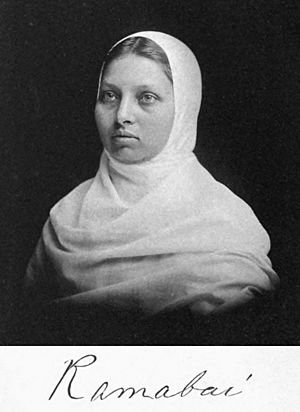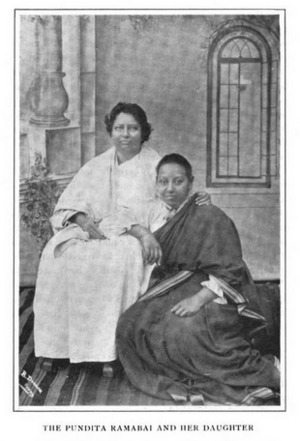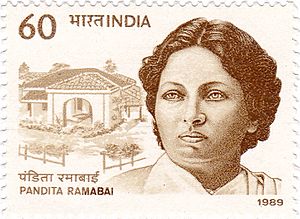Pandita Ramabai facts for kids
Quick facts for kids
Pandita Ramabai
|
|
|---|---|

Christian social reformer
|
|
| Born | April 23, 1858 Karnataka, India
|
| Died | April 5, 1922 Maharastra
|
Pandita Ramabai (born April 23, 1858, died April 5, 1922) was an amazing Indian social reformer. She was also a talented poet and a very smart scholar. Ramabai worked tirelessly to improve the lives of women in India. She especially focused on their education and safety.
Contents
Early Life and Learning
Pandita Ramabai Sarasvati was born as Ramabai Dongre on April 23, 1858. Her father, Anant Shastri Dongre, was a Sanskrit scholar. He taught Ramabai Sanskrit at home. This was very unusual for girls at that time.
When she was 16, a big famine happened between 1876 and 1878. Ramabai became an orphan during this time. She and her brother, Srinivas, continued their family tradition. They traveled across the country, reciting Sanskrit holy texts.
Ramabai was comfortable speaking to everyone. However, women back then usually did not come out in public. Sometimes, she would go into the women's private areas. She did this to convince them to get an education.
Ramabai became famous for her knowledge of Sanskrit. People in Calcutta invited her to speak. Her speech at Calcutta University was very well-received. It earned her great praise. In 1878, Calcutta University gave her special titles. They called her "Pandita" and "Sarasvati." These titles recognized her deep knowledge of Sanskrit works.
In 1880, Ramabai married Bipin Behari Medhvi, a lawyer. They had a daughter on April 16, 1881. They named her Manorama, which means "heart's joy." Sadly, Bipin Bihari Medhvi died from cholera on February 4, 1882. Ramabai was only 23 years old. After his death, she moved to Pune. There, she started an organization to help women get an education.
Working for Social Change
Ramabai earned money from her first book, Stri Dharma Niti. This book, published in 1882, was about "Morals for Women." With these earnings, she went to Britain in 1883. She wanted to study medicine there. However, she could not join medical programs. This was because she was slowly losing her hearing. During her time in Britain, she became a Christian.
In 1886, Ramabai traveled from Britain to the United States. Dr. Rachel Bodley invited her. Dr. Bodley was the Dean of the Women's Medical College of Pennsylvania. Ramabai went to see her relative, Anandibai Joshi, graduate. Anandibai was the first female Indian doctor. Ramabai stayed in the U.S. for two years. During this time, she translated textbooks. She also gave many lectures across the United States and Canada.
She also published a very important book called The High-Caste Hindu Woman. This book showed the difficult lives of Hindu women. It aimed to reveal how women were treated unfairly in British India. Through her efforts, Ramabai raised a lot of money. It was enough to start a school in India for girls and widows.
In 1889, Ramabai returned to India. A very bad famine happened in 1896. Ramabai traveled through the villages of Maharashtra. She used bullock carts to rescue thousands of children and women. These included orphans and those who had no home. She brought them to the safety of the Mukti Mission. By 1900, the Mukti Mission had 1,500 residents. It also had over a hundred cattle.
Ramabai was a very learned woman. She knew seven languages. She also translated the Bible into her native language, Marathi. She translated it from the original Hebrew and Greek texts. The Pandita Ramabai Mukti Mission is still active today. It provides homes, education, and job training. It helps many people in need, including widows, orphans, and the blind.
Later Life and Death
Ramabai died on April 5, 1922. She passed away from a lung infection called septic bronchitis. This was just a few weeks before her 64th birthday.
Awards and Special Recognition
- She received the titles "Pandit" and "Sarasvati" in Bengal. This was before she went to Britain. These titles recognized her amazing skills in Sanskrit.
- She was awarded the Kaisari-i-Hind Medal in 1919. This was for her great community service. The British Colonial Government of India gave her this award.
- The Church of England remembers her on April 30. This is a special day of remembrance.
- On October 26, 1989, the Government of India issued a special stamp. This stamp honored her contributions to helping Indian women.
See also
 In Spanish: Pandita Ramabai para niños
In Spanish: Pandita Ramabai para niños
 | Jewel Prestage |
 | Ella Baker |
 | Fannie Lou Hamer |



